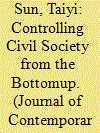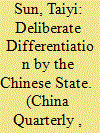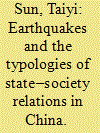| Srl | Item |
| 1 |
ID:
187923


|
|
|
|
|
| Summary/Abstract |
It is often the conception in the literature that civil society’s major challenge in an authoritarian country like China would be from the state directly. This study utilizes over 1200 surveys conducted in Sichuan Province, 67 in-depth interviews with local government officials and CSO leaders, and case studies from communities that CSOs operated to provide an often-overlooked challenge. Based on the research in rural Sichuan, this article finds that the Chinese state at the local level does not spend a significant amount of energy directly interfering with CSOs, but uses institutional constraints to create divisions between the citizenry and CSOs. This article proposes the trialism conception in understanding civil society in authoritarian countries. The state could create conditions that reduce the confidence of individual citizens in CSOs and thus control society from the bottom up without having to apply a significant amount of direct repressions to the CSOs.
|
|
|
|
|
|
|
|
|
|
|
|
|
|
|
|
| 2 |
ID:
169790


|
|
|
|
|
| Summary/Abstract |
Do authoritarian governments’ responses towards different civil society organizations (CSOs) reflect policy differentiations? Building on the existing literature of graduated control, diversification of civil society, and consultative authoritarianism, this paper utilizes an online field experiment,1 and interviews with government officials and CSO leaders to demonstrate that local governments have the tendencies to intentionally treat different CSOs with different policy responses, referred to as “deliberate differentiation” in this paper. However, contrary to what the existing literature would suggest, this study reveals that at the local level, such differentiation is driven more by the state's interest in extracting productivity and outsourcing responsibility for the provision of public goods and less by the state's need to acquire information from CSOs, including politically sensitive advocacy groups.
|
|
|
|
|
|
|
|
|
|
|
|
|
|
|
|
| 3 |
ID:
156520


|
|
|
|
|
| Summary/Abstract |
The proliferation of civil society organizations after the 2008 Wenchuan earthquake and the 2013 Lushan earthquake in China has caught the attention of scholars in Chinese politics and disaster politics. Immediately after the earthquakes and during the recovery period, civil society organizations were given a rare opportunity to work closely and intensely with the state. As a result, these organizations adjusted their behaviour – sometimes compromising with the state on many fronts – in exchange for better relations with the state and in order to achieve their goals, but they had to work in new and creative ways. Drawing on evidence from a dozen case studies and 61 in-depth interviews with government officials and leaders of civil society organizations in Sichuan Province, this article argues that we can map the state’s preferences and policy distinctions through its varied responses to these organizations during an earthquake recovery period. Specifically, whether the state is more effective in delivering public goods and services in a given area and whether the goals of civil society organizations align with those of state are two key determinants of relations between the state and civil society organizations. This article proposes a comprehensive typology of such relations in China: complementary, cooperative, competitive and confrontational. These categories are not static, because the government and civil society organizations adjust their policies and behaviour as they interact. These learning experiences, triggered by the earthquakes, create a dynamic process of evolving state–society relations in China today.
|
|
|
|
|
|
|
|
|
|
|
|
|
|
|
|
| 4 |
ID:
177249


|
|
|